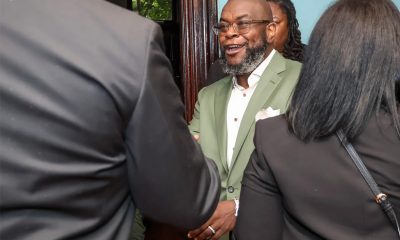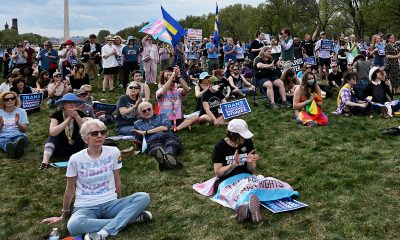World
Russian police arrest 30 at gay rights rally
Organizer punched in the face before authorities detained him, others

Police on Saturday arrested 30 gay advocates who tried to stage a Pride march in the Russian capital. (Photo by Dmitry Azovtsev via Wikimedia Commons)
Reuters reported authorities took the advocates into custody outside Moscow City Hall for violating the Russian capital’s ban on gay rights marches. A photo that Nikolai Alekseev, co-founder of Moscow Pride, posted to his Facebook page shows a man punching him in the face before his arrest.
Gay Star News on Friday reported Russian authorities came to Alekseev’s home and warned him, his mother and another Pride organizer that they could face charges under Russian law if they staged the event.
“I don’t know what will happen tomorrow and how many people will be courageous enough to turn up for Moscow Pride,” Alekseev told the website.
The Moscow arrests took place against the backdrop of increasing criticism against the Russian government for widespread anti-LGBT discrimination and violence in the country.
The State Department in January criticized the passage of a bill in the Russian Duma that would prohibit the “promotion of homosexuality” to minors. Russian lawmakers are expected to give final approval to the measure in the coming weeks.
A St. Petersburg court in February upheld a previous ruling that dismissed a lawsuit against Madonna for violating the city’s ban on “homosexual propaganda” to children during an August 2012 concert.
Two men remain in custody after they allegedly sodomized Vladislav Tornovoi with empty beer bottles and set his body on fire near Volgograd on May 10 after he reportedly came out to them following a night of drinking.
Gay Ukrainian advocates rally; Georgian activists attacked
Dozens of advocates held the Ukraine’s first gay rights rally in the country’s capital, Kiev, in spite of an earlier court ruling that banned it on the same day Russian authorities arrested Alekseev and other Moscow Pride participants.
The Ukraine march took place eight days after thousands of people attacked a few dozen Georgian gay rights advocates who tried rally in Tbilisi, the country’s capital, to commemorate the annual International Day Against Homophobia.
Irakli Vacharadze, founder of Identoba, a Georgian LGBT advocacy group that organized the rally, told the Washington Blade earlier this month that violence against gays and lesbians in the former Soviet republic remains a serious concern. He said on May 19, two days after the mob attacked him and other rally participants, that “we are sitting in our homes” and “can’t get out.”
As for Alekseev, authorities released him from custody a few hours after his arrest.
“I am now safe and in the safe location,” he said in post to his Facebook page on Saturday. “We did it! Thanks to all [who] came out without fear despite the bans.”
Argentina
LGBTQ seniors in Argentina face uncertain future
President Javier Milei’s policies have disproportionately impacted retired pensioners

Editor’s note: International News Editor Michael K. Lavers will be on assignment in Argentina and Uruguay through April 12.
Argentina has undergone significant changes in its economic and social policies since President Javier Milei’s inauguration in December 2023. These changes have had a significant impact on various sectors of society, especially retirees and the LGBTQ community.
Mercedes Caracciolo, a 79-year-old sociologist and lesbian activist, shared her experience with the Washington Blade on how the new measures have affected her quality of life.
“Since Milei’s arrival in government, which began with a brutal devaluation, I am more careful in my spending than I was before,” she said.
Although Caracciolo has additional income from rental properties, she recognizes the situation is much more critical for those who exclusively depend on a pension.
With more than 7 million people receiving pensions, many find themselves “scratching the poverty line” due to the loss of purchasing power. The libertarian government’s economic policies have drastically affected their welfare, leading to a wave of protests across the country.
The reduction of social programs and the lack of LGBTQ-specific public policies have deepened the difficulties that seniors already face. The loss of economic stability particularly affects those who have historically lived on the margins, with fewer job opportunities and limited access to a decent retirement. Many older LGBTQ people, who have spent their lives unable to form traditional families, now find themselves without a support network and with an increasingly less present State.
The advance of conservative discourses has also generated a climate of insecurity and fear.
“There is no more sense of security and stability in old age,” Graciela Balestra, a psychologist who is the president of Puerta Abierta a la Diversidad, the first home for LGBTQ seniors in Argentina, explained. “Many LGBTQ+ retirees fear that there are fewer and fewer rights. They see what is happening in Argentina and globally with the advance of the right wing, and they feel that what they worked so hard to achieve is in jeopardy.”
In addition to economic difficulties, the LGBTQ community has faced additional challenges.
Caracciolo noted many supportive spaces have had their government subsidies reduced or eliminated, weakening community networks essential to the well-being of LGBTQ seniors.
“Community networks are also weakened because many of them require state support for certain types of expenses,” she noted.
Balestra warned about the psychological impact.
“Obviously it impacted mental health. There is much more anxiety, there is fear. People who say ‘I’m afraid they’ll kill me’ or ‘I’m afraid to show myself,'” she said. “Before, they used to walk down the street holding hands with their partner, and now they don’t do it anymore. A lot of hopelessness.”
For Balestra, the concern goes beyond the LGBTQ community.
“The economic issue, the rights issue, the fear that something similar to the dictatorship will return. All of this is very scary. And besides, the hopelessness of believing that this is going to continue, that it is not going to change even in the next elections,” she said.
Civil society organizations have denounced an “adjustment” in policies related to gender and diversity that Milei’s government has undertaken. Pride marches in Argentina have become a stage for protests against the president’s policies, especially over his speeches that activists consider hateful towards the LGBTQ community.
Balestra stresses the fear is not only individual, but collective.
“Human rights no longer exist anywhere, women no longer have the place they used to have, they are once again objectified, machismo is on the rise again,” she said. “This brings a lot of despair to older people.”
Despite the climate of uncertainty, Balestra emphasizes resistence forces are still in force.
“We continue working, as always,” she said. “For 25 years at Puerta Abierta we have been doing reflection groups, cultural workshops, social meetings, all with respect to being able to make LGBT people aware of their rights. We never stop meeting, but lately we are talking more and more about these things that we had already left a little behind. The issue of coming out, fear, visibility. Now we have to talk about it again.”
Africa
Report: Anti-LGBTQ discrimination has cost East African countries billions
Open for Business highlights Kenya, Uganda, Tanzania, and Rwanda

The economies of four East African countries are losing more than $5 billion a year because of discrimination against LGBTQ people.
The 80-page report that Open for Business, a coalition of leading global organizations that champion LGBTQ inclusion, released in late March focuses on Kenya, Uganda, Tanzania, and Rwanda. It attributes the losses to anti-homosexuality laws, and predicts more economic costs if lawmakers implement other harsh anti-LGBTQ measures.
The report notes Uganda is losing $2.4 billion, or 5.2 percent of its GDP, annually because of the Anti-Homosexuality Act that took effect in 2023. Open for Business last October revealed the country had already lost $1.6 billion in foreign direct investment, donor aid, trade, tourism, public health and productivity after President Yoweri Museveni signed the law.
Kenya is losing $1.5 billion, or 1.38 percent of its GDP.
The report warns that enacting the pending Family Protection Bill would cost the country an additional $6.3 billion, or 5.8 percent of its GDP, annually. Opposition MP Peter Kaluma, who has introduced the measure, in January claimed the Biden-Harris administration had blocked it and vowed to have fellow MPs pass it after U.S. President Donald Trump’s inauguration.
Kaluma is a strong supporter of Trump and the Republican Party’s opposition to LGBTQ rights and other far-right conservative ideologies.
Tanzania is losing $1.1 billion, or 1.33 percent of its GDP, because of anti-LGBTQ discrimination. Rwanda is losing $45 million, or .32 percent of its GDP.
Homosexuality is not illegal in Rwanda unlike the other three countries, but consensual same-sex sexual relationships remain taboo. Queer Rwandans also face stigma, discrimination, social exclusion, and arbitrary detention.
“A series of private member bills in Uganda, Kenya, and Tanzania have threatened to pull the region back in terms of progress and human rights for LGBTQ+ people, and damage both the ease of doing business and their international reputation,” states the Open for Business CEO Dominic Arnall.
Arnall notes his organization’s extensive engagement with businesses across East Africa over the last five years has always linked harmful anti-LGBTQ laws to impacts on a country’s investment prospects.
“The finding lays bare an uncomfortable truth: That laws that harm the LGBTQ+ community are standing in the way of prosperity and growth for all citizens in the region,” he said.
The report calls for LGBTQ inclusion as part of the region’s broader economic development agenda.
The Open for Business report notes anti-gay violence and discrimination in Tanzania has been on the rise since the late-President John Magufuli came to power in 2015. The country’s punitive anti-homosexuality law with a 30-year prison sentence for consensual same-sex sexual relations was already in place, but queer Tanzanians were generally not systematically targeted.
“Reporting of neighbors or community members for suspected homosexuality is frequent and law enforcement officers have been known to pose as members of the LGBTQ+ community to entrap and blackmail LGBTQ+ individuals,” states the report.
It also notes the Tanzanian government’s crackdown on websites and social media accounts that promote LGBTQ rights and threatening the arrests of administrators who allow such content. The report concludes this suppression has caused queer people to live in fear and isolation.
Religious organizations, particularly Christian churches in Tanzania, also champion anti-LGBTQ rhetoric by encouraging their followers against tolerating homosexuality and transgender people. Politicians, meanwhile, use anti-LGBTQ narratives to gain support during campaigns.
While Rwanda stands out as the only East African country in which homosexuality is not criminalized and has foreign donors implementing programs that target the queer community, discussing LGBTQ rights in public is rare and same-sex relationships are not legally recognized. The Open for Business report notes this situation creates legal ambiguity and a fragile social environment for queer Rwandans.
“Several LGBTQ+ rights organizations have emerged in recent years, mostly in Kigali, although they do not always identify themselves as LGBTQ+ associations and are rarely formally registered, making it difficult for them to receive funding,” reads the report.
The Rwandan government has rejected calls to criminalize homosexuality, which it considers a “private matter.” It has also been adamant against efforts to protect queer people for fear of domestic opposition and a desire not to politicize the issue like in neighboring countries.
Kenya, like Rwanda, has for a long time been considered more receptive of queer people, “as long as LGBTQ members are not ‘too loud.’”
Anyone convicted under Kenya’s colonial-era sodomy law could face up to 14 years in prison. Efforts to enact a harsh anti-homosexuality law and anti-LGBTQ protests that religious leaders, politicians, and activists have organized have increased homophobia in the country.
“LGBTQ individuals report significant difficulties in securing formal employment, which pushes many of them into more precarious livelihoods in the informal sector,” states the report.
Trinidad and Tobago
Trinidad and Tobago recriminalizes homosexuality
Court of Appeal on March 25 overturned 2018 ruling

An appeals court in Trinidad and Tobago has recriminalized consensual same-sex sexual relations in the country.
Jason Jones, an LGBTQ activist from Trinidad and Tobago who currently lives in the U.K., in 2017 challenged Sections 13 and 16 of the country’s Sexual Offenses Act. High Court Justice Devindra Rampersad the following year found them unconstitutional.
The country’s government appealed Rampersad’s ruling.
Court of Appeal Justices Nolan Bereaux and Charmaine Pemberton overturned it on March 25. The Daily Express newspaper reported Justice Vasheist Kokaram dissented.
“As an LGBTQ+ citizen of Trinidad and Tobago, this regressive judgement has ripped up my contract as a citizen of T&T and again makes me an unapprehended criminal in the eyes of the law,” said Jones in a statement he posted to social media. “The TT Court of Appeal has effectively put a target on the back of LGBTQIA+ people and made us lower class citizens in our own country.”
Antigua and Barbuda, St. Kitts and Nevis, Barbados, and Dominica are among the countries that have decriminalized consensual same-sex sexual relations in recent years.
The Inter-American Commission on Human Rights in 2021 issued a decision that said Jamaica must repeal its colonial-era sodomy law. The Jamaican Supreme Court in 2023 ruled against a gay man who challenged it.
A judge on St. Vincent and the Grenadines’s top court last year dismissed two cases that challenged the country’s sodomy laws.
Jones in his statement said he “will be exercising my right of appeal and taking this matter to the” Privy Council, an appellate court for British territories that can also consider cases from Commonwealth countries.
King Charles III is not Trinidad and Tobago’s head of the state, but the country remains part of the Commonwealth.
“I hope justice will be done and these heinous discriminatory laws, a legacy of British colonialism, will be removed by the British courts,” said Jones.
-

 Maryland3 days ago
Maryland3 days agoAt transgender visibility celebration, Moore called out for lack of action
-

 National3 days ago
National3 days agoDestination Tomorrow works to empower LGBTQ community
-

 Arts & Entertainment3 days ago
Arts & Entertainment3 days ago‘Think of those who have not been seen,’ Cynthia Erivo’s powerful message at GLAAD Awards
-

 Africa2 days ago
Africa2 days agoReport: Anti-LGBTQ discrimination has cost East African countries billions










